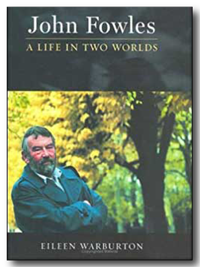By Bob Goosmann
Note: the following gives away key plot points in both the novel The Magus and the movie The Game. If you have not already read/seen them, proceed at your own risk (for the sake of simplicity, I’m assuming that everyone who reads this has at least read The Magus).
When watching the David Fincher film The Game at a movie theater shortly after its release in 1997, I began to get a strange feeling that the whole thing seemed vaguely familiar. Near the end of the film—a very good one, in my opinion—I realized with a shock why I was feeling this way. I eagerly searched the closing credits for some sign of the words “The Magus” or “John Fowles,” to no avail.
I have no idea whether the screenwriters of The Game—John Broncato and Michael Ferris—actually based their overall premise on The Magus. But I’d be willing to bet that one or both of them read it at some point. Perhaps their unconscious memory of the book colored their screenplay, or maybe they intended the movie as a subtle homage to the book…but the parallels definitely seem more than coincidental.
Let’s start with the most obvious connection: the main character of The Magus is Nicholas Urfe; the main character of The Game is Nicholas Van Orton (played by Michael Douglas and henceforth referred to as Douglas). In itself, not that unusual–although you would expect a more mainstream name for Douglas’ mainstream character. But in the context of what’s to come, it’s a truly amazing “coincidence.”
Although separated by perhaps 25 years age-wise, the two characters are very similar. Nicholas is a handsome, jaded, rather miserable young man who has no idea what’s really important in life; Douglas is a handsome, jaded, rather miserable middle-aged man who has no idea what’s really important in life.
In addition, the individual who draws Nicholas into the “game” in The Magus is named Conchis; in the movie, this role is played by his brother, named Conrad. Again, a remarkable coincidence.
The basic premise of both stories is the same: a man is thrust into a “game” in which rational rules do not apply, no one can be trusted and the purpose is obscure (one of the alternative titles that Fowles considered for The Magus was actually The Godgame).
In The Game, Douglas is drawn into a mysterious situation by Conrad, who gives him a card for his birthday that entitles him to a “game” put on by Consumer Recreation Services (CRS). He is subsequently told by a CRS representative that “each game is specifically tailored for each participant” (as was Nicholas’ game by Conchis) and that “we provide whatever is lacking” (as Conchis ultimately provided to Nicholas).
As Douglas is drawn deeper into the game, he meets a mysterious blonde named Christine who, like Julie in The Magus, rapidly shifts back and forth between trusted friend and suspicious conspirator. After things have gotten way out of hand, she ends up hiding out with Douglas at a remote cabin…and the following scene could have been lifted directly from The Magus.
Douglas is drugged by Christine (as was Nicholas after “The Trial“) and wakes up to find himself in a Mexican grave. The parallel between this scene and Nicholas waking up on top of the Greek ruins is profound…the end of each game is being indicated (supposedly) by the abrupt change in setting and tone. It is now up to Douglas (and Nicholas) to turn detective in an effort to find out what it was all about.
While, unlike The Magus, the ending of The Game is full of the pyrotechnics one would expect from a major Hollywood movie, both Douglas and Nicholas end up in a similar place: wiser, more mature, able to better understand what life is really about, and ultimately appreciative of the ordeal that they have been put through. And both the movie and the book conclude on an ambiguous note.
Also interesting: Conchis’ fictional movie company in The Magus was called “Polymus Films,” while The Game was distributed by “Polygram Films.”
During a visit with Fowles in 1998, I asked him if he had seen The Game, and if so, if he had noticed the parallels with The Magus. It turns out that not only had he seen the movie, but he actually considered suing the producers. His lawyers ultimately decided, however, that it would be a difficult case to prove.
